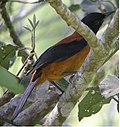A mixed-species feeding flock, also termed a mixed-species foraging flock, mixed hunting party or informally bird wave, is a flock of usually insectivorous...
25 KB (2,918 words) - 17:21, 30 October 2024
Flocking also offers foraging benefits and protection from predators, although flocking can have costs for individual members. Flocks are often defined as...
12 KB (1,458 words) - 09:46, 10 September 2024
species than can be variable and widespread. Not to be confused with a mixed-species foraging flock, a behavior in which birds of different species feed...
42 KB (3,676 words) - 23:30, 17 October 2024
suggested that pishing may be treated as an invitation to join a "mixed-species foraging flock" and birds do not themselves vocalize or show aggressive behaviour...
4 KB (549 words) - 21:57, 4 August 2024
Fish migration (redirect from Highly migratory species)
organism. List of diadromous orders and families, and the number of known species: Forage fish often make great migrations between their spawning, feeding and...
27 KB (2,821 words) - 04:47, 25 October 2024
Greater racket-tailed drongo (category IUCN Red List least concern species)
help in the formation of mixed-species foraging flocks, a feature seen in forest bird communities where many insect feeders forage together. These drongos...
22 KB (2,437 words) - 12:57, 24 September 2024
Black-naped monarch (category IUCN Red List least concern species)
flycatcher, and in tropical forest habitats, pairs may join mixed-species foraging flocks. Populations differ slightly in plumage colour and sizes. The...
18 KB (1,939 words) - 21:55, 25 April 2024
Hooded pitohui (category IUCN Red List least concern species)
frequently joins and even leads mixed-species foraging flocks. Its diet is made up of fruits, seeds and invertebrates. This species is apparently a cooperative...
30 KB (3,612 words) - 10:11, 24 September 2024
Velvet-fronted nuthatch (category IUCN Red List least concern species)
with good tree cover and are often found along with other species in mixed-species foraging flocks. Adult males can be told apart by the black stripe that...
15 KB (1,787 words) - 16:16, 2 November 2024
Bar-winged flycatcher-shrike (category IUCN Red List least concern species)
is found hunting in the mid-canopy of forests, often joining mixed-species foraging flocks. They perch upright and have a distinctive pattern of black...
12 KB (1,276 words) - 18:18, 27 February 2024








